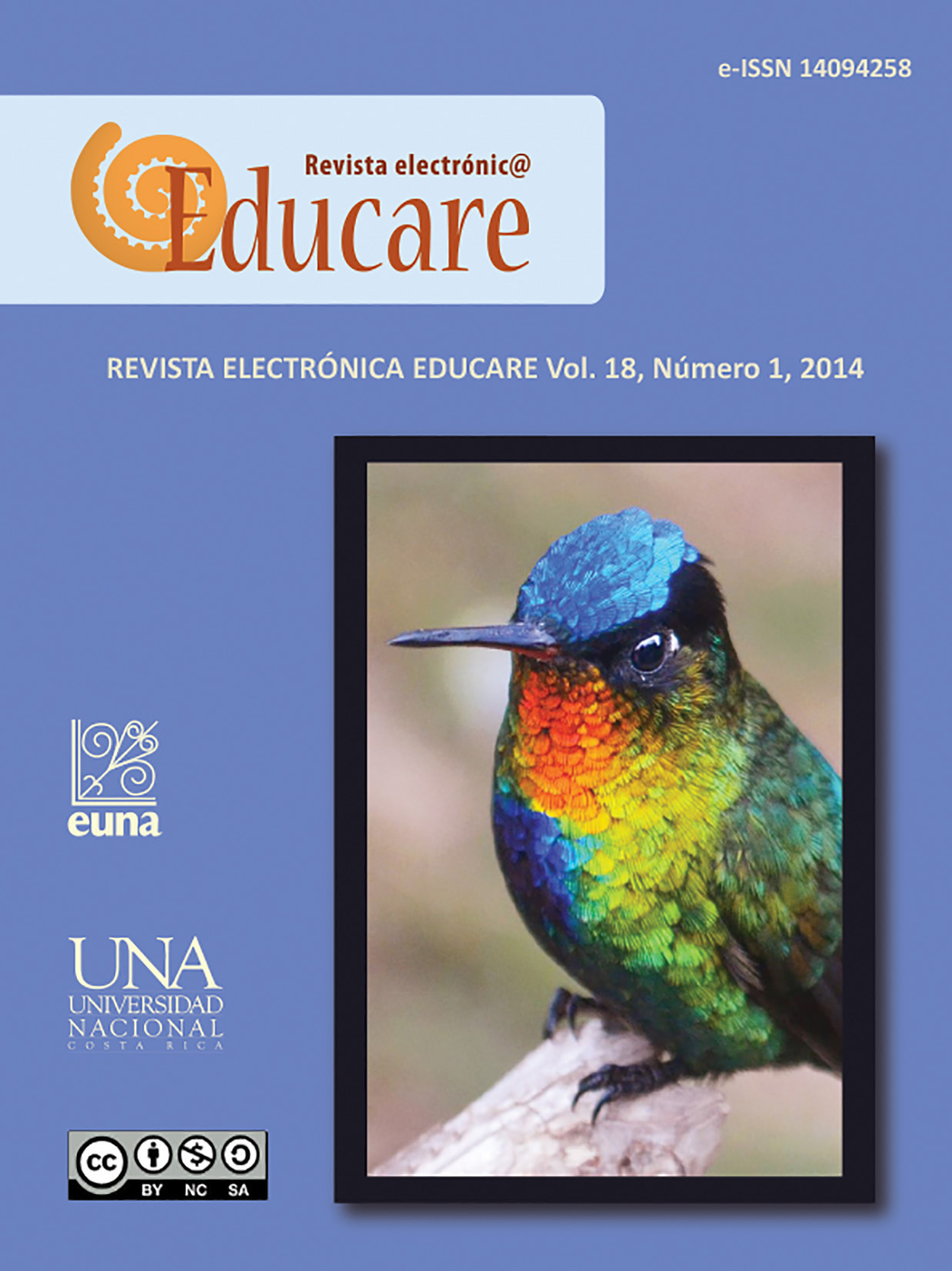Comprehensive Training of Engineering Students through Continuing Education
DOI:
https://doi.org/10.15359/ree.18-1.4Keywords:
Comprehensive training of engineers, continuing education, engineering student.Abstract
This paper addresses a priority for student training in general and particularly for future engineers. Although this issue has been frequently addressed in recent years, proposals are still insufficient for engineering students. This paper is aimed at theoretically and empirically demonstrating the potential of continuing education as one of the key areas that engineering schools have for the comprehensive training of students. Preliminary results of a research project commissioned by the School of Mechanical and Electrical Engineering (Facultad de Ingeniería Mecánica y Electrica-FIME) of Universidad Autónoma de Nuevo León, Mexico, are presented to respond to the need to improve the learning process of students with a comprehensive approach. The research justification and some of the results obtained in the exploratory phase are also described.
References
Álvarez, J. (mayo-agosto, 2002). La educación en valores. Emergencia del proceso formativo. Humanidades Médicas, 2(2), 1-33. Recuperado de http://scielo.sld.cu/scielo.php?pid=S1727-81202002000200005&script=sci_arttext
Álvarez, N. (marzo, 2013). La renovación personal del docente: Premisa para un cambio radical en Pedagogía. Apuntes de Pedagogía, 4, 18-19. Recuperado de www.cdlmadrid.org/cdl/htdocs/boletines/.../apuntespedagogia11.pdf
Asociación Nacional de Facultades y Escuelas de Ingeniería (ANFEI). (junio, 2000). La formación humanística del ingeniero. Conclusiones. Trabajo presentando en la XXVII Conferencia Nacional de Ingeniería. Instituto tecnológico de Toluca. Recuperado de http://www.anfei.org.mx/XXVII_CNI/conclusiones_XXVII_CNI.pdf
Asociación Nacional de Universidades e Instituciones de Educación Superior (ANUIES). (2000). La educación superior en el siglo XXI. Líneas estratégicas de desarrollo. México: Autor. Recuperado de http://cedoc.infd.edu.ar/upload/La_educacion_superior_en_el_siglo_XXI.pdf
Cabrera J. (marzo, 2013). ¿Hacia dónde vamos? Reflexiones en torno a la renovación pedagógica. Apuntes de Pedagogía, 4, 16-17. Recuperado de: www.cdlmadrid.org/cdl/htdocs/boletines/.../apuntespedagogia11.pdf
Consejo Federal de Decanos de Ingeniería (CONFEDI). (2006). Competencias genéricas. Desarrollo de competencias en la enseñanza de la ingeniería argentina (Primer acuerdo). San Juan: Facultad de Ingeniería, Universidad Nacional de San Juan Recuperado de http://www.bioingenieria.edu.ar/academica/actualizacion/CursoCompetenciasCONFEDI.pdf
Cornejo, J., Santilli H. B., Roble, M. B., Martín, A. M., Barrero, C. y Barbiric, D. (agosto, 2013). Las cuestiones éticas y sociales en la formación del ingeniero. Tres estudios de caso en bioingeniería. Revista Argentina de Enseñanza de la Ingeniería, 2(4), 7-15. Recuperado de http://www.ing.unrc.edu.ar/raei/archivos/img/arc_2013-09-02_07_58_23-n4t01.pdf
De la Herrán, A. y Muñoz J. (2002). Educación para la universalidad. Más allá de la globalización. Madrid: Dilex.
Fraile, A. A. (2007). La formación didáctica y profesional del profesorado de educación física. Revista Motricidad Humana, 4(1): 20-30. Recuperado de http://www.cleverboxideas.com/revista/wp-content/uploads/2013/01/FormacionDidactica.pdf
León, A. y Ramírez, D. C. (junio, 2010). Visión prospectiva de la formación en ingeniería. Trabajo presentado en Eighth LACCEI Latin American and Caribbean Conference for Engineering and Technology (LACCEI’2010). “Innovation and Development for the Americas”. Arequipa, Perú. Recuperado de http://www.laccei.org/LACCEI2010-Peru/published/EInn023_Arenas.pdf
Mejía, A. (1986). Educación continua. Educación Médica y Salud, 20(1), 43-69. Recuperado de http://hist.library.paho.org/Spanish/EMS/6916.pdf
Méndez, D. (julio-diciembre, 2007). Nuevos retos en la formación de ingenieros. Revista Ciencias de la Educación, 17(30), 223-231. Recuperado de http://www2.scielo.org.ve/pdf/rce/v17n30/art14.pdf
Pineda, P., y Sarramona, J. (setiembre-diciembre, 2006). El nuevo modelo de formación continua en España: Balance de un año de cambios. Revista de Educación, 341, 705-736. Recuperado de http://www.revistaeducacion.mec.es/re341/re341_29.pdf
Soto, L., Dimas, M. I. y Torres, A. (abril, 2012). Caracterización y perspectivas del proceso de formación del docente de la Facultad de Ingeniería Mecánica y Eléctrica de la UANL. Educación y futuro. Revista de investigación aplicada y experiencias educativas, 26, 241-260. Recuperado de http://dialnet.unirioja.es/servlet/ejemplar?codigo=303117
Downloads
Published
How to Cite
Issue
Section
License
1. In case the submitted paper is accepted for publication, the author(s) FREELY, COSTLESS, EXCLUSIVELY AND FOR AN INDEFINITE TERM transfer copyrights and patrimonial rights to Universidad Nacional (UNA, Costa Rica). For more details check the Originality Statement and Copyright Transfer Agreement
2. REUTILIZATION RIGHTS: UNA authorizes authors to use, for any purpose (among them selfarchiving or autoarchiving) and to publish in the Internet in any electronic site, the paper´'s final version, both approved and published (post print), as long as it is done with a non commercial purpose, does not generate derivates without previous consentment and recognizes both publisher's name and authorship.
3. The submission and possible publication of the paper in the Educare Electronic Journal is ruled by the Journal’s editorial policies, the institutional rules of Universidad Nacional and the laws of the Republic of Costa Rica. Additionally, any possible difference of opinion or future dispute shall be settled in accordance with the mechanisms of Alternative Dispute Resolution and the Costa Rican Jurisdiction.
4. In all cases, it is understood that the opinions issued are those of the authors and do not necessarily reflect the position and opinion of Educare, CIDE or Universidad Nacional, Costa Rica. It is also understood that, in the exercise of academic freedom, the authors have carried out a rogorous scientific-academic process of research, reflection and argumentation thar lays within the thematic scope of interest of the Journal.
5. The papers published by Educare Electronic Journal use a Creative Commons License:














 The articles published by Educare Electronic Journal can be shared with a Creative Commons License:
The articles published by Educare Electronic Journal can be shared with a Creative Commons License: 



